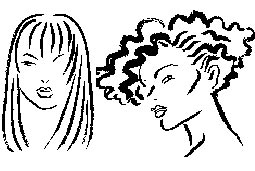 Hair is curly or straight, depending upon the
number of disulfide bonds between hair proteins found in
the hair shaft. Hair is curly or straight, depending upon the
number of disulfide bonds between hair proteins found in
the hair shaft.
The greater the number of links, the curlier the hair, and
the fewer the number of links, the straighter the hair.
Hair is primarily composed of keratin, a protein,
which grows from a sac called the follicle. Cells in the hair
follicle generate keratin, and various other proteins, which
become a part of the hair shaft. These proteins contain sulfur
atoms, and when two of these sulfur atoms pair up and bond,
they form a disulfide bond. If the two sulfur atoms in the
same protein are at a distance, and join to form the disulfide
bond, the protein will bend.
The amount of humidity in the air not only makes for what
some label a "bad hair day," but alters the degree of
curliness or of straightness of hair. This occurs when high
humidity forces water back into the hair fiber, acts on its
protein structure, and forces the hair shaft to return to its
original structure.
People can temporarily alter their hair to force it into a
straight state, or a curly state, but only on a temporary, not
on a permanent, basis. When a straight-haired person gets a
"permanent wave," known as a "perm,"he or she is
chemically forcing the making of strong disulfide bonds. The
wave does not stay permanently, because new hair, which is
straight, grows in as the "perm" grows out. People with curly
hair may chemically alter their hair to give it a straighter
appearance, but this, too, is also a temporary solution to a
permanent "problem," with the same end result. |
毛干
角蛋白
烫发
|